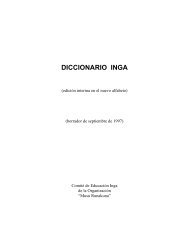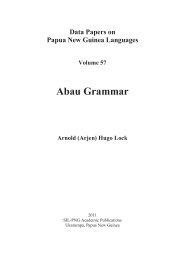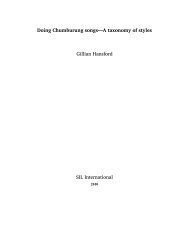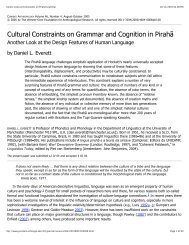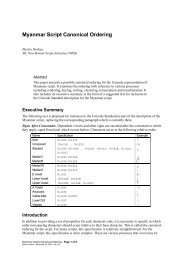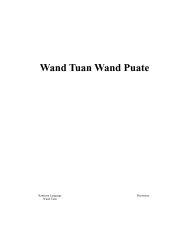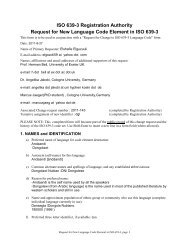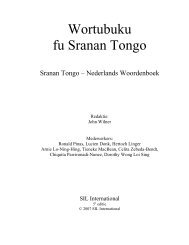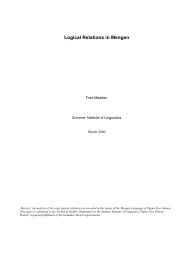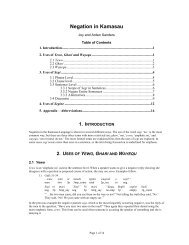A Comprehensive Comparison of Lexemes in the ... - SIL International
A Comprehensive Comparison of Lexemes in the ... - SIL International
A Comprehensive Comparison of Lexemes in the ... - SIL International
Create successful ePaper yourself
Turn your PDF publications into a flip-book with our unique Google optimized e-Paper software.
4<br />
1.3 Methodology<br />
1.3.1 The advantage <strong>of</strong> dictionaries over Swadesh wordlists<br />
There are a number <strong>of</strong> advantages <strong>of</strong> a comparison <strong>of</strong> lexemes based on<br />
comprehensive dictionary data, ra<strong>the</strong>r than on a Swadesh wordlist. First, a<br />
Swadesh wordlist is English-based and does not give an adequate picture <strong>of</strong> <strong>the</strong><br />
richness or idiosyncrasies <strong>of</strong> a language. Second, when a Swadesh wordlist is<br />
compiled by a l<strong>in</strong>guistic surveyor who is largely unfamiliar with <strong>the</strong> language, <strong>the</strong><br />
likelihood <strong>of</strong> errors is greater than when a l<strong>in</strong>guist compiles a dictionary over<br />
time as he or she becomes familiar with <strong>the</strong> language.<br />
1.3.1.1 Discover<strong>in</strong>g idiosyncrasies <strong>of</strong> a language<br />
A lexicon based on a language <strong>of</strong> wider communication (LWC) is unlikely<br />
to elicit words for which <strong>the</strong>re is no equivalent <strong>in</strong> <strong>the</strong> LWC. For <strong>in</strong>stance, it is<br />
unlikely that an English-speak<strong>in</strong>g surveyor would discover words for which <strong>the</strong>re<br />
is no English or Bislama equivalent. 2<br />
Table 1.2 lists some <strong>of</strong> <strong>the</strong> lexemes <strong>in</strong> Tanna’s languages which are<br />
idiosyncratic and would not typically show up on a general survey list.<br />
Table 1.2. Some idiosyncratic lexemes <strong>in</strong> <strong>the</strong> languages <strong>of</strong> Tanna.<br />
verbal break <strong>of</strong>f a leaf at its stem<br />
eat food with a leaf<br />
erect wild cane to ensorcel garden<br />
trespassers<br />
expectorate kava<br />
give someone a piggyback ride<br />
mash someth<strong>in</strong>g between <strong>the</strong> f<strong>in</strong>gernails<br />
roast <strong>in</strong> an ear<strong>the</strong>n oven<br />
scrape with <strong>the</strong> side <strong>of</strong> a knife<br />
wear a bark skirt<br />
wear someth<strong>in</strong>g around <strong>the</strong> neck<br />
wear someth<strong>in</strong>g <strong>in</strong> <strong>the</strong> hair<br />
nom<strong>in</strong>al half-eaten food<br />
house for newborns<br />
kava drunk dur<strong>in</strong>g daylight<br />
Additionally, Tanna vernaculars have idiosyncratic words for ceremonies,<br />
such as dances and rites <strong>of</strong> passage, and for localized methods <strong>of</strong> cultivation. For<br />
example, Tanna languages list five stages <strong>of</strong> a coconut and more than a hundred<br />
types <strong>of</strong> banana, taro, and sweet potato. Lexical data elicited through surveys<br />
would not turn up <strong>the</strong>se words; <strong>the</strong>y are discovered over time.<br />
2 Bislama is one <strong>of</strong> <strong>the</strong> <strong>of</strong>ficial languages <strong>of</strong> Vanuatu, toge<strong>the</strong>r with English and French. It is an English<br />
pidg<strong>in</strong> which is becom<strong>in</strong>g creolized.



